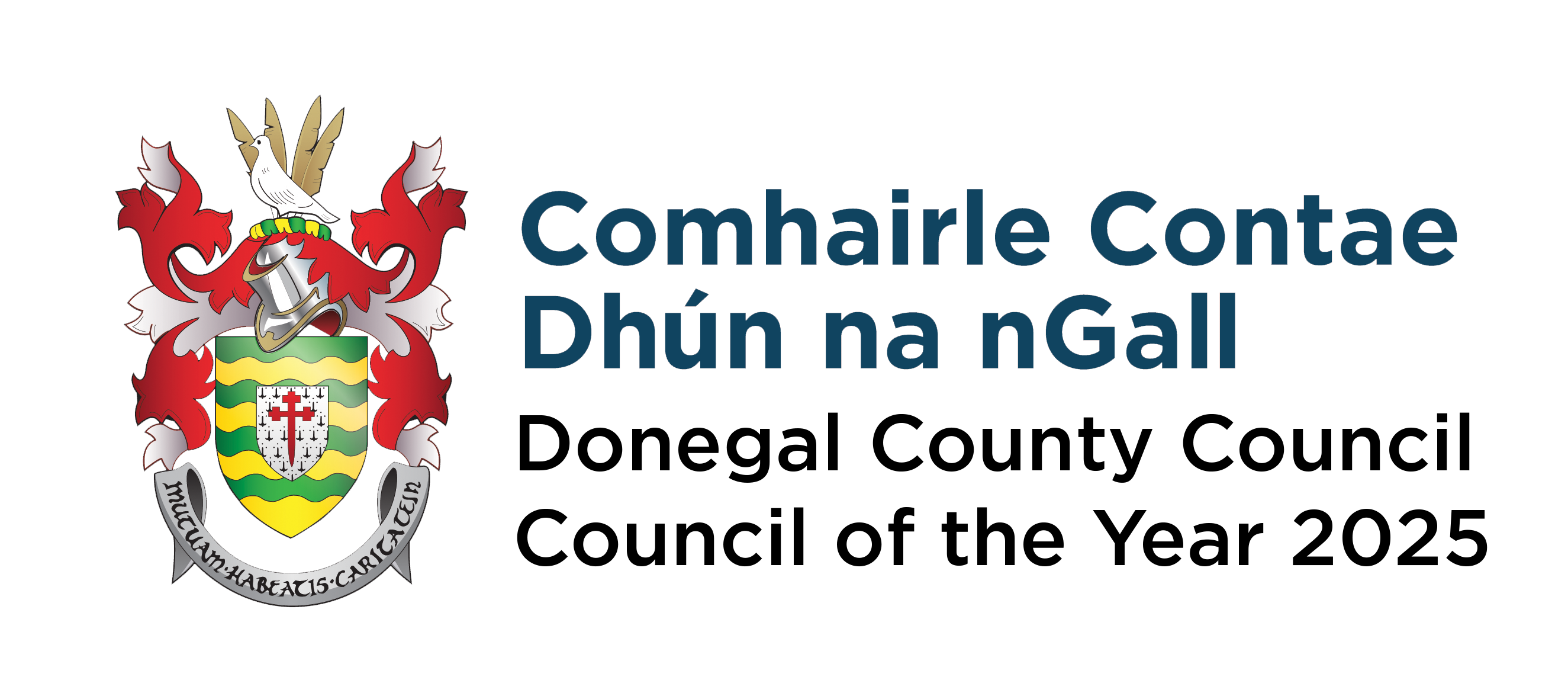DONEGAL‘S DECARBONISING ZONES
In response to Action 165 of the Government’s Climate Action Plan 2019, Local Authorities were required to ‘identify and develop plans for one Decarbonising Zone’ within their respective administrative area, for submission to the Department of Housing Local Government and Heritage (DHLGH), as action lead, in Q2 2021, Circular Letter LGSM01-2021.
A Decarbonising Zone (DZ) was defined as: “Spatial area identified by the local authority, in which a range of climate mitigation, adaptation and biodiversity measures and action owners are identified to address local low carbon energy, greenhouse gas emissions and climate needs to contribute to national climate action targets”.
Decarbonising Zones will provide a test bed of what is possible for decarbonisation and climate action at local and community levels, to help support and realise national climate objectives. The DZ is the focus for a range of climate mitigation, adaptation and biodiversity measures including the identification of projects and outcomes to assist in the delivery of the National Climate Objective.
In the period intervening, strengthened climate policy enshrined through the Climate Action and Low Carbon Development (Amendment) Act 2021, and the publication of the Climate Action Plan 2021, influenced change to the delivery of DZs, from the approach previously advised. The Department of Environment, Climate and Communications (DECC) were advised as the action leads for local authority climate action planning and DZs.
The LACAP is acknowledged as being an important instrument to promote and activate community level climate action. The relationship between the LACAP and DZs being seen as instrumental in the advancement of the DZs. To ensure the success of DZs in developing and implementing climate change at local level they were given statutory footing as part of the LACAP as notified by DECC in 2023.
DZs are now a component of the LACAP and subject to the process, statutory timeframes, and procedural requirements of developing the LACAP as provided for by legislation. Technical Annex D of the Local Authority Climate Action Plan Guidelines entitled “Decarbonising Zones” supports local authorities in the development of DZ.
Purpose of Decarbonising Zones
DZs play a crucial role in not only accelerating learning and innovation but also understanding the complexity and scale of decarbonising the economy and wider society. They serve as platforms to experiment with new technologies, policies, and strategies for decarbonisation and provide a controlled environment where researchers, businesses, and policymakers can collaborate to test and refine innovative solutions.
This spatial area serves as a trial ground for new ideas, facilitates collaboration and knowledge-sharing, and informs decision-making for scaling up decarbonization efforts.
DZs enable stakeholders to gather data and insights on the feasibility, effectiveness, and costs of different decarbonization measures. This information can then be used to inform decision-making at a larger scale, facilitating the replication and scaling up of successful interventions across the County, in other regions or other sectors.
Local Authorities are considered key drivers to advance the implementation of national climate policy at local level. They have a deep understanding of their local context, including the specific climate challenges and opportunities in their area. They can tailor national climate policies to suit local needs and priorities, ensuring effective implementation.
Despite not having direct authority over all sectors, Local Authorities can still have a significant impact on emission reductions through working with key stakeholders to influence, coordinate, facilitate and advocate for change.
Working as one community, in partnership, and sharing our knowledge, skills, and experiences to deliver effective climate action.
Decarbonising Zone Selection
DZs vary in terms of their nature, size, shape, geographical location, as well as natural and built characteristics. Annex D notes the stages involved in developing the framework for DZs and is informed by the place-based and systems- thinking approach to generate locally tailored policy and assist in the delivery of effective climate action. The key characteristics being continuous learning and improvement over time, with engagement and collaboration with stakeholders crucial
Following guidance set out in Circular Letter LGSM01-2021 issued by the DHLGH in February 2021, DCC invited communities to submit an expression of interest to be selected to become a DZ for Donegal. All submissions were examined and a number of workshops were held with Elected Members. After this process it was agreed to select two DZs for County Donegal. These are:
An Fálcarrach/Gort an Choirce
Carndonagh
MINDSET – Mission Orientated Innovation towards Digital and Green Transitions in the Northern Periphery and Arctic Area Communities.

MINDSET – Mission Orientated Innovation towards Digital and Green Transitions in the Northern Periphery and Arctic Area Communities.
Project Status: Live Project
Project Manager for Donegal County Council: Lorraine Arbuckle
EU Programme: Interreg Northern Periphery and Arctic Programme (2021-2027)
Project Budget: €1,370,649
Start Date: March 2025
Finish Date: March 2028
Project Website: MINDSET: Driving Digital & Green Innovation in NPA Regions
Aim & Objectives:
The aim of the project is to:
MINDSET uses Mission-Oriented Innovation (MOI) to tackle major challenges like climate change, housing, and skills development.
Through Regional MOI (RegMOI), global goals become local actions, using regional resources for real solutions. By uniting governments, businesses, and scientists, MINDSET helps build greener, smarter, and more resilient communities.
Specific objectives are to:
• Prepare regional stakeholders from 3 NPA territories to introduce the novel concept of Regional Mission Orientated Innovation (Reg MOI) as a new way of driving innovation suitable to address societal challenges
• Test the effectiveness of RegMOI by applying it in the implementation of concrete missions addressing skills development, climate change and regional housing and public real estate challenges
• Create the conditions to integrate RegMOI as a new innovation method to address major societal challenges, where local/regional stakeholders are empowered and play a significant role aligned with supra-level missions
Partners:
• ERNACT, European Regions Network for the Application of Communications Technology, ERNACT - European Digital Network
• Donegal County Council
• Umeå University, Sweden Umeå University
• University of Helsinki, Finland https://www.helsinki.fi/en
• Örnsköldsvik Municipality, Sweden Välkommen till Örnsköldsviks kommun
Associated Organisations:
• Juvan kunta, Finland
• Pieksämäen kaupunki, Sweden
• Kangasniemen kunta, Finland
• Climate Action Regional Office, Ireland

